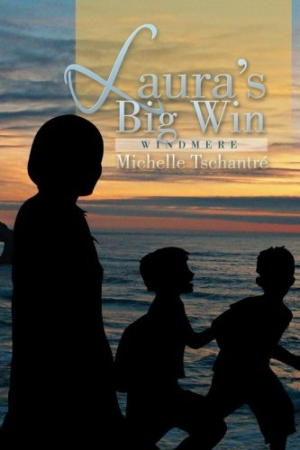
Laura's Big Win
In Laura’s Big Win, Michelle Tschantré puts a modern spin on the Cinderella story.
By her own admission, Laura Nessing wore blinders throughout her marriage to Richard. She accepts his distance and disdain as well as his assurances that their financial life is under control. And so when it all comes crashing down, she is suddenly on her own with two young children and without a home, car, or money. Laura finds her way to a shelter, and that’s when fate steps in to lend a hand.
Ryan Williams is a wealthy, handsome widower. When he sees Laura and her children on a news segment, he feels compelled to help them. He has them whisked away to Windmere, the luxurious resort hotel he owns, and soon Laura is offered a home, a job, and, eventually, a second chance at love.
Tschantré’s novel has a certain sweet charm, and many romance readers will enjoy the way that the romantic relationship between the two main characters slowly gains momentum. Laura’s quickly changing circumstances are explored in depth, and a picture of life at the opulent resort is painted with minute detail. This comprehensive approach occasionally results in an overload of information.
Most of the dialogue is natural and effective, although the tendency toward overly descriptive text spills over to the dialogue as well. Characters sometimes speak in a frantic rush, which results in some awkward and stilted conversations.
The characters of Laura and Ryan are developed well enough that readers will feel they know what makes them tick. Supporting characters—such as Alice, the pseudo-matriarch of the Windmere staff, and Dennis, the former football player who is built like a bear but gentle as a kitten—are developed with a sufficient amount of detail. However, the author falters a bit with Laura’s children; six-year-old Jack’s attitude and articulation come across as too mature and advanced for his age.
Laura’s Big Win flows at a leisurely pace toward a conclusion many readers will find satisfying. The author spurs the story on periodically through significant statements about the characters’ future, such as when a few minor characters meet for the first time: “And so it went, but in the end four people met in the carriage house loft at Windmere for pizza and beer…It would become a weekly event, and in the course of time, a lot more.”
While the novel is well constructed, the plot itself often feels contrived. The likelihood of Laura’s nearly instant rescue from the shelter totters on the edge of credibility, as does the probability of her being handed a large “hiring bonus” when the former stay-at-home mom is immediately offered a top job at the Windmere corporation. The credibility issue is exacerbated by the sudden introduction of a supernatural element halfway through the story.
Laura’s Big Win is the first in Tschantré’s planned series set at Windmere, and her second installment is currently available. While a suspension of disbelief is necessary for full engagement and enjoyment, readers who appreciate a good fairytale romance will not be disappointed.
Reviewed by
Jeannine Chartier Hanscom
Disclosure: This article is not an endorsement, but a review. The publisher of this book provided free copies of the book and paid a small fee to have their book reviewed by a professional reviewer. Foreword Reviews and Clarion Reviews make no guarantee that the publisher will receive a positive review. Foreword Magazine, Inc. is disclosing this in accordance with the Federal Trade Commission’s 16 CFR, Part 255.
